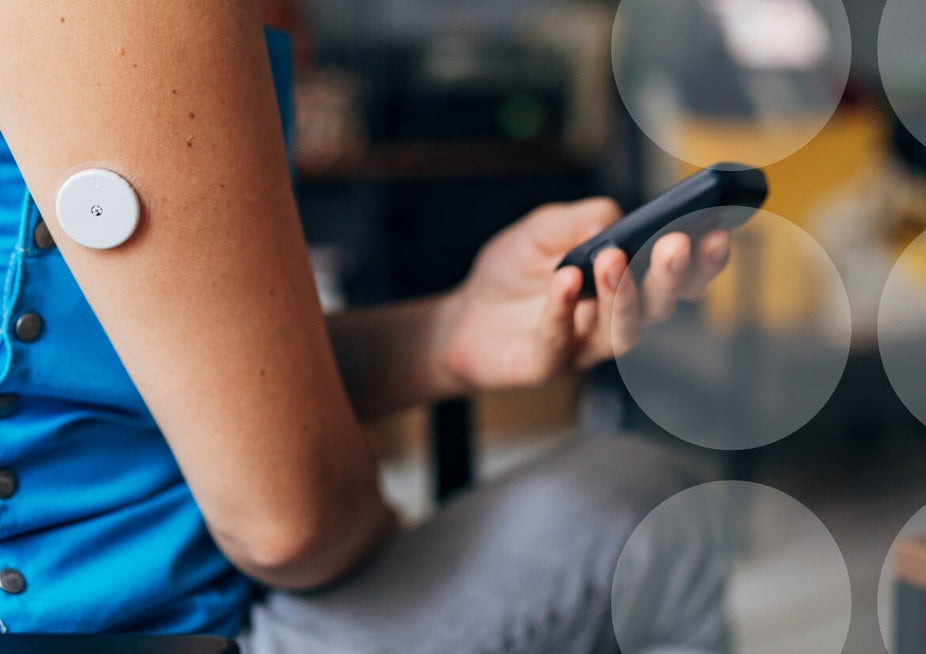How can PCOS affect fertility?
PCOS affects female hormones that are vital for fertility. We look at how you can improve your chances of conception.
If you’re diagnosed with polycystic ovary syndrome (PCOS), your thoughts may jump straight to whether you will be able to conceive or not. Though sometimes challenging, most women diagnosed with PCOS go on to have a baby if they choose to.
In this blog we discuss:
- What can affect fertility in people with PCOS
- Lifestyle factors to help improve your chances of fertility
- Medical intervention that may be used to improve your chances of fertility
What can affect fertility in PCOS?
1. Ovulation
If your PCOS is severe, you may experience symptoms that can affect your ovulation.
Factors that can influence your ovulation:
- Irregular and/or lengthy menstrual cycles
- Absent menstrual cycles (amenorrhea)
- A hormone imbalance
- Polycystic ovaries
These factors can prevent you from ovulating regularly, or in some cases, at all. And, if ovulation occurs erratically, it can take longer than the average to conceive.
PCOS represents 80% of anovulatory (lack of ovulation) infertility cases [1]. But that is not to say you will never be able to conceive (it only takes one healthy egg!).
If your menstrual cycle is irregular, you should take steps to help improve your regularity, as achieving regular monthly ovulation will give you a better chance of conceiving.
It is possible to achieve more regular cycles by a combination of lifestyle changes and, where appropriate, medication to induce ovulation.
It is also possible to have regular cycles but still not be ovulating regularly – if you have been trying to conceive for over 12 months then it may be best to seek medical advice. You can read more about infertility in our fertility guide.
2. Obesity
A large percentage of women with PCOS are overweight or struggle to lose weight. Apart from this being distressing and causing issues with self-esteem, being overweight can have a considerable effect on your fertility by worsening your PCOS symptoms.
Obesity (particularly carrying extra weight around the abdomen) can increase the risk of:
- Insulin resistance
- Hyperandrogenism (excess of male hormones)
- Not ovulating
- Gestational diabetes
The good news is that reducing your body weight, by at least 5-10%, can reduce your PCOS symptoms (and increase the likelihood of ovulation) [2].
Often, you will need to have a body mass index (BMI) below 30 to be eligible for fertility treatments. Therefore, working on reducing your BMI is a great first step. To reduce your BMI, you need to be in a calorie deficit (move more than you eat or eat less than you move). And don’t worry, the gym isn’t always the answer, there are other ways to get moving too.
3. Psychosexual dysfunction
Psychosexual dysfunction refers to sexual problems or difficulties that may be caused by emotional issues.
Emotional issues that can affect sex include:
- Depression
- Low self-esteem
- Poor body image
Research shows that psychosexual dysfunction is increased in women with PCOS, with up to 62% of women reporting sexual problems [3]. This could be down to some of the physical symptoms that can occur with PCOS too.
Physical symptoms of PCOS include:
- Hirsutism (thick hair in unwanted places)
- Male pattern hair loss
- Acne
- Obesity
- Irregular periods
- Infertility
These symptoms may cause a loss of feminine identity and a feeling of being unattractive.
If you are lacking self-esteem, it may impact not only your sex life but also your quality of life. If you are looking to conceive, it is recommended that you have regular sex, every two to three days throughout your cycle.
However, if you are feeling low, this may not seem possible. If your emotions are affecting your sex life, seek medical advice from your doctor as they may be able to refer you to a psychosexual counsellor.
Psychosexual counsellors can help you to:
- Improve your self-esteem
- Become body positive
- Regain an intimate relationship with your partner
Improving fertility in PCOS
When looking to improve your fertility in PCOS, it is important you first start with simple lifestyle changes, such as:
- Eating a healthy balanced diet
- Exercising regularly
- Reducing stress
- Increasing your quality of sleep
- Taking supplements, such as inositol
We have explained these lifestyle factors further in five ways to manage your PCOS symptoms. However, there are other ways to improve your fertility in PCOS, which we’ve outlined below.
1. Think about what you drink
The food you eat should not be the only thing you consider when thinking about a healthy, balanced diet. Drinking things such as caffeine or alcohol could have an impact on your fertility.
While more research is required to understand the impact that caffeine has on your ability to conceive, it is well documented that when trying to conceive, women should limit caffeine intake to 200mg a day [4]. Tommy’s has a great calculator to help you work out your current caffeine intake.
Instead of caffeinated drinks, enjoy naturally decaffeinated beverages and plenty of water. Avoid sugary carbonated drinks such as coke as these contain high sugar levels that may affect your insulin and blood sugar levels.
Alongside reducing your caffeine intake, it is best for both parties to avoid alcohol when trying to conceive, as research has shown that alcohol can affect both ovulation and sperm quality [5,6].
2. Try to quit smoking
Women who smoke are around twice as likely to be infertile compared to non-smokers. It’s great if you can cut down, but even small amounts of cigarette smoke (smoking one to five cigarettes a day) can put you at greater risk of ectopic pregnancy, premature birth, and low birth weight. So, it’s best if you can quit altogether. If you stop smoking, the risk to your baby will reduce, similar to someone that’s never smoked.
If you’re finding it too difficult to quit, you might consider nicotine replacement therapy. This can help to combat the addiction while avoiding exposing you to harmful chemicals. See the NHS website for more tips.
Vaping is also thought to be less harmful than smoking as it produces fewer toxins. Though with it being a relatively new practice, it’s not certain what effect this could have on your baby. There is evidence to suggest it may affect your balance of reproductive hormones and the likelihood of an embryo successfully implanting [7]. So, it’s best to avoid this too if you can.
3. Consider your mental health (not just stress levels)
Depression, stress, and anxiety are common with PCOS, but are often overlooked and sometimes left untreated. Evidence shows that almost half of women with PCOS suffer from stress, with 35% of women describing their stress levels as high [8].
We also know that depression and anxiety levels rise the longer it takes to receive a diagnosis of PCOS. And depression, stress, and anxiety with PCOS can affect your life in several ways.
Ways mental health can affect PCOS include:
- Sleep and eating patterns
- Low levels of motivation
- Increased feelings of worthlessness
- How much time you spend socialising
Research shows that experiencing the symptoms of PCOS can also negatively affect mood, self–esteem, and body image [9].
Experiencing poor mental health with PCOS can make it challenging to want to follow a healthy lifestyle and be proactive about your health. This creates a vicious circle of reducing motivation which, can be difficult to break. However, working with friends and families, as well as charities, such as Verity, can put you on the right path to better symptom management, and in turn, a better quality of life.
4. Track your cycle
When you receive a diagnosis of PCOS, you may be told that you are not ovulating. Women with PCOS often fail to ovulate or ovulate infrequently (meaning in some cases you could ovulate but not be aware that you are) [10].
You can find out if you are ovulating or not with a blood test such as an Ovulation Progesterone Blood Test. However, if your periods are irregular, you can take a blood test like this on the wrong day of the month and receive inaccurate results.
Even if you have irregular periods, you can still track them. Try an app like Flo to help you keep track of any symptoms and how irregular your periods are. You may find that there is a pattern, just you have more of a 72-day cycle instead of the average 28 days.
Other ways to track your cycle include:
- Measuring your basal body temperature
- Using over-the-counter ovulation kits
- Regular blood testing
We have more information on trying to conceive in our fertility guide.
5. Investigate your vitamin D levels
During the summer, it is possible to get all the vitamin D you need from sunlight and your diet. However, the Department of Health and Social Care recommends that everyone (including pregnant and breastfeeding women) should consider taking a daily supplement containing 10mcgs of Vitamin D during the autumn and winter [11].
A vitamin D deficiency can exacerbate PCOS symptoms, including [12]:
- Ovulation
- Menstrual irregularities
- Infertility
- Low mood
Making sure you have a healthy amount of vitamin D can be helpful in both relieving PCOS symptoms and increasing your chances of conception.
You can read more about vitamin D and vitamin D deficiency in our vitamin D guide.
6. Consider medical intervention
Though lifestyle management should be the first port of call, it is not always the answer for treating PCOS-related infertility. In some cases, you may need medical intervention such as medications, or even surgery.
PCOS-related infertility is usually due to either you not ovulating irregularly, or not ovulating at all. So, the first step is to get you ovulating – usually with medication.
Ovulation induction medications can include:
- Clomiphene (or Clomid) – Stimulates the ovaries to ovulate.
- Letrozole – This is the most used treatment for ovulation as it has a 40-60% increased likelihood of successful conception compared to clomiphene [3]. However, there are higher risks of a multiple-birth pregnancy.
- Metformin – Helps to lower insulin and blood sugar levels in women with PCOS.
- Gonadotropin – Used when women have not conceived after using the above treatments.
Ovulation induction medication is usually prescribed by a fertility specialist or gynaecologist rather than your GP. That is why it is important to speak to your GP if you are worried about your fertility as they can ask for a referral to a specialist.
If none of these medications works, you may be offered laparoscopic ovarian surgery. And, if you have a BMI of greater than 40, you may be offered bariatric surgery to lower your BMI and increase your chances of fertility.
Bariatric surgery can however have potential adverse effects on both maternal and neonatal health, so should be discussed and considered in-depth with your specialist.
Finally, if ovulation induction and metformin treatment are unsuccessful, you may be offered assisted conception treatment to conceive.
Assisted conception treatments include:
- Intrauterine insemination (IUI)
- In vitro fertilisation (IVF)
- Intracytoplasmic sperm injections (ICSI)
You can read more about assisted conception treatments in what treatments can help me conceive.
How can blood testing help me in my fertility and PCOS journey?
Blood testing can help you investigate any concerns when it comes to wanting to conceive. We have put together a fertility buying guide that talks about the fertility blood tests we offer, and which one could be the right choice for you.
You can also use our test finder.
References
- Melo, A., Ferriani, R. and Navarro, P., 2015. Treatment of infertility in women with polycystic ovary syndrome: approach to clinical practice. Clinics, 70(11), pp.765-769.
- Balen, A., Dresner, M., Scott, E. and Drife, J., 2006. Should obese women with polycystic ovary syndrome receive treatment for infertility?. BMJ, 332(7539), pp.434-435.
- Monash.edu. 2022. [online] Available at: <https://www.monash.edu/__data/assets/pdf_file/0004/1412644/PCOS_Evidence-Based-Guidelines_20181009.pdf> [Accessed 23 June 2022].
- Tommy's. 2022. Caffeine and getting pregnant. [online] Available at: <https://www.tommys.org/pregnancy-information/planning-a-pregnancy/are-you-ready-to-conceive/caffeine-and-getting-pregnant> [Accessed 24 June 2022].
- Anwar, M., Marcus, M. and Taylor, K., 2021. The association between alcohol intake and fecundability during menstrual cycle phases. Human Reproduction, 36(9), pp.2538-2548.
- Zhang, S., Wang, L., Yang, T., Chen, L., Zhao, L., Wang, T., Chen, L., Ye, Z., Zheng, Z. and Qin, J., 2019. Parental alcohol consumption and the risk of congenital heart diseases in offspring: An updated systematic review and meta-analysis. European Journal of Preventive Cardiology, 27(4), pp.410-421.
- Szumilas, K., Szumilas, P., Grzywacz, A. and Wilk, A., 2020. The Effects of E-Cigarette Vapor Components on the Morphology and Function of the Male and Female Reproductive Systems: A Systematic Review. International Journal of Environmental Research and Public Health, 17(17), p.6152.
- Zangeneh, F. Z., Jafarabadi, M., Naghizadeh, M. M., Abedinia, N., & Haghollahi, F. (2012). Psychological distress in women with polycystic ovary syndrome from imam khomeini hospital, tehran. Journal of reproduction & infertility, 13(2), 111–115.
- ANNAGÜR, B., TAZEGÜL, A. and AKBABA, N., 2014. Polikistik Over Sendromu Olan Kadınlarda Beden Algısı, Benlik Saygısı ve Depresif Belirtiler. Nöro Psikiyatri Arşivi, 51(2), pp.129-132.
- nhs.uk. 2022. Polycystic ovary syndrome - Symptoms. [online] Available at: <https://www.nhs.uk/conditions/polycystic-ovary-syndrome-pcos/symptoms/#:~:text=During%20each%20menstrual%20cycle%2C%20the,it%20difficult%20to%20get%20pregnant.> [Accessed 24 June 2022].
- nhs.uk. 2022. Vitamin D. [online] Available at: <https://www.nhs.uk/conditions/vitamins-and-minerals/vitamin-d/#:~:text=The%20Department%20of%20Health%20and,they're%20frail%20or%20housebound> [Accessed 24 June 2022].
- Wu, M. and Lin, M., 2015. The role of vitamin D in polycystic ovary syndrome. Indian Journal of Medical Research, 142(3), p.238.
Related tests
Trying to conceive or tracking your ovulation? This test measures progesterone levels to confirm if ovulation has occurred, making it ideal for those monitoring their fertility
- Results estimated in 2 working days
- 1 biomarkers
Finger-prick or Venous collection
Select testAre you experiencing symptoms of PCOS like irregular periods, excess facial hair, or oily skin? Perhaps you’ve been diagnosed with PCOS and want to check your cholesterol levels and diabetes risk
- Results estimated in 4 working days
- 19 biomarkers
Venous collection
Select testAre you experiencing symptoms of PCOS like irregular periods, excess facial hair, or oily skin? Perhaps you’ve been diagnosed with PCOS and want to check your cholesterol levels and diabetes risk
- Results estimated in 4 working days
- 19 biomarkers
Venous collection
Select test






